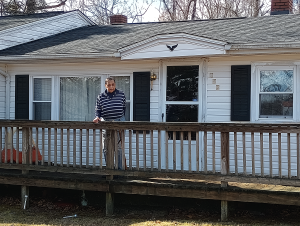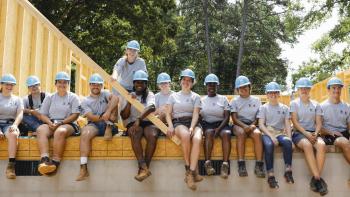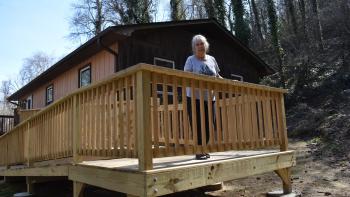“Apana Shochalaya” or our toilets: Provide inclusive sanitation facilities for eleven schools
While Habitat already works in the Indian states of Maharashtra, Odisha and Tamil Nadu, this project would support the building of more proper sanitation units with toilets, water tanks and handwashing stations.
Climate-resilient villages: Improve housing, sanitation and incomes for 500 vulnerable people in Indonesia
Mauk, Indonesia, is home to 90,000 people, with an average of four to five individuals per household. Around 35,000 live in extreme poverty. This project will help build decent, climate-resilient housing to help improve the lives of people living in extremely poor conditions.
Clean start: Enable 120 families in Vietnam to build their own latrines and improve their health
Habitat has worked with communities in Quang Nam province for over 15 years, and it’s home to marginalized groups with great needs. This project will focus on building and showing examples of good, affordable latrines to help alleviate the sanitation issues these households face.
Mera Ghar (My House): Fulfill the dreams of 13 families in need of a decent home
This project will focus on helping build safe, decent housing for communities living in extreme poverty in the Indian states of Rajasthan, Maharashtra, Odisha and Tamil Nadu.
Bringing generations together through Habitat service projects
Habitat for Humanity affiliates across the U.S. are leading Team Up service projects to help people build connections across differences with others. Truman Heritage Habitat’s Team Up project brought an intergenerational group together to renovate two homes in Eastern Jackson County, Missouri.
At a glance:
- Habitat for Humanity partnered with three trusted nonprofits to launch Team Up, an initiative to build connections through service projects.
- Habitat affiliates across the U.S. design and facilitate local Team Up projects.
- Truman Heritage Habitat’s Team Up project brought together an intergenerational group to repair two homes in Eastern Jackson County, Missouri.
A Habitat for Humanity build site is a place where people of all backgrounds unite for a common purpose — where volunteers come together and join future homeowners to build affordable homes, hone skills, create memories and develop friendships.
Mike first witnessed the power of Habitat when the 23-year-old participated in a Truman Heritage Habitat for Humanity intergenerational build alongside other young adults and a group of mostly retired volunteers. He wasn’t sure how he might fit in with the older volunteers, but his nerves quickly turned into enthusiasm.
He began showing up early for the weekly build days in Eastern Jackson County, Missouri, eager to learn new skills and spend time with fellow builders. Mike created a particularly close bond with 69-year-old volunteer Tom. The two spent hours together each week, exchanging stories while renovating a pair of homes.
During lunch, the young adults and older volunteers sat on paint buckets and lawn chairs in a semi-circle in the driveway and shared meals, stories, advice and laughter. “I felt like I was in a whole new family,” Mike says.
Habitat connects younger and older volunteers
Truman Heritage Habitat’s intergenerational project is part of Team Up, a nationwide initiative launched in February 2024 by Catholic Charities USA, Habitat for Humanity International, Interfaith America and YMCA of the USA to help people build connections across differences with others in their communities through service. Team Up was first announced and endorsed by U.S. President Joe Biden during the bipartisan United We Stand Summit hosted at the White House in September 2022.
Through Team Up, Habitat affiliates across the U.S. design local projects to bring people together. Recognizing that their existing volunteer base was older and that they struggled to engage younger volunteers, Truman Heritage Habitat created their intergenerational Team Up project to help address the issue.
To identify young adults to participate, the affiliate partnered with Cornerstones of Care, a local youth and family support service organization. Mike and his cohort are part of Cornerstones of Care’s transitional living program, designed to support youth leaving foster care or struggling with housing and homelessness. The affiliate plans to expand its partnership with Cornerstones of Care and other local organizations to continue hosting intergenerational groups.
Facilitating intergenerational connection
Truman Heritage Habitat matched the young adults with several of the affiliate’s regular, weekly volunteers, including Tom. The participants gathered every Thursday for several months in late 2023 to help renovate two homes.
After each week’s build day, the young adults received a tool to keep. By the end of the project, in addition to his toolbelt and tools, Mike had also collected critical construction skills like how to install siding and flooring.
Tom says the lessons were a “two-way street” and that the older volunteers “got more out of it sometimes than the young people.” From learning new phone tricks to bantering over lunch, he says, “The project was a really eye-opening experience for all of us. There was never a dull moment.”
“It was like my whole life changed”
Mike was raised in foster care and was living alone in Kansas City, Missouri, when he joined Cornerstones of Care’s transitional living program. When Mike became part of Truman Heritage Habitat’s Team Up project, he says, “It was like my whole life changed.” Energized by Habitat’s mission and the camaraderie of working side by side with fellow volunteers, Mike looked for ways to stay engaged beyond the 6-week project.
That’s when he learned about Habitat’s partnership with AmeriCorps, a federal agency connecting individuals and organizations across the U.S. to tackle the nation’s most pressing challenges. The Habitat AmeriCorps program places AmeriCorps members with Habitat affiliates to help build and repair homes, expand affordable housing services and engage their community — all while gaining lifelong skills and hands-on nonprofit experience.
Mike applied to join Habitat AmeriCorps and calls the day he was accepted into the program one of the best days of his life. He plans to serve two years as a Habitat AmeriCorps member before pursuing a full-time career in construction.
“I have a new job, a new community, a new set of friends and new skills,” Mike says. “It’s one of those things you have to put yourself out there to know. If you don’t put your foot out there, you don’t know what life can bring.”
Learn how you can serve with Habitat AmeriCorps
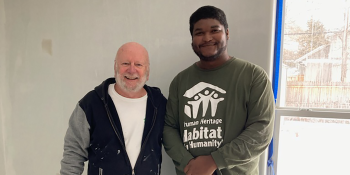
Bringing generations together through Habitat service projects
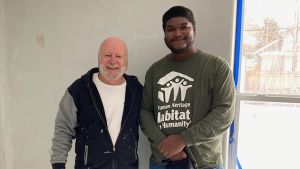
“Saur Oorja” or Solar Power
Take 250 rural households from darkness to light with clean, green solar energy
Evidence brief: Affordable accessory dwelling units
Read research highlights to learn how accessory dwelling units, or ADUs, can help improve access to affordable housing for low-income households and more accessible housing for older adults. Plus, find out how four Habitat for Humanity affiliates are working to implement ADUs in their communities.
Helping a longtime resident age in place
The place Sheila called home for nearly 70 years had a leaky roof and an inaccessible bathroom, but she lacked the finances to pay for the repairs herself. Habitat and Lowe’s helped Sheila repair her roof and bathroom, ensuring she can comfortably live in her beloved childhood home.
Sheila has lived in her childhood home in Franklin County, Virginia, since she was 7 years old. A leaky roof and an inaccessible bathroom, however, made it increasingly difficult to comfortably reside in the place she’s called home for nearly 70 years.
Sheila uses two canes for mobility, so navigating the tub made taking a shower challenging. Then, a crack made the tub unusable altogether. “Sometimes, I would go to my daughter-in-law’s to take a shower,” she says. Her roof was also deteriorating. Sheila first discovered a leak in her storage closet, but soon other areas of her roof started to leak.
The 75-year-old knew that if she wanted to remain in her treasured home and one day pass it on to her family, she would need to repair the roof and bathroom. But finances were tight for Sheila, who retired several years ago after a long career as a seamstress and local factory worker.
A friend told Sheila about Habitat for Humanity of Franklin County’s affordable home repair program, and she decided to apply to see if the program could help.
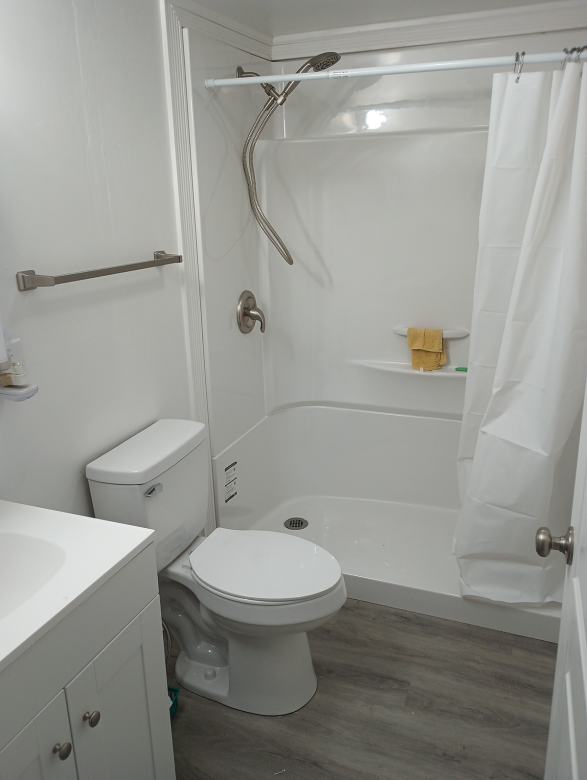
With funding support from Lowe’s, Habitat Franklin County helped Sheila build an accessible bathroom.
Working together to serve more families
Financial support from Lowe’s helped offset the cost of Sheila’s home repairs. “Lowe’s made Sheila’s repair achievable for us,” says Sheila Overstreet, Habitat Franklin County’s executive director. “Their grant helped us with the cost of her repair. Without that funding, we couldn’t do as many repairs as we’re performing in Franklin County.”
Since 2003, Lowe’s has donated more than US$92 million to Habitat. Their support over the past two decades has helped more than 18,000 families across more than 600 communities in the U.S., Canada and India improve their living conditions. In 2022 alone, 78 affiliates were able to complete 483 repair and community revitalization projects with the help of grants funded by Lowe’s.
“At Lowe’s, we know housing conditions are critical to the prosperity of families and communities,” says Julie Yenichek, Lowe’s senior director of community relations. “The critical home repair and rehabilitation projects we support with Habitat help families improve their homes and can help older adults with fixed incomes age in place with dignity.”
Preserving a lasting legacy
Habitat Franklin County replaced Sheila’s roof and remodeled the bathroom. The bathroom modifications — fixing a sunken-in floor, moving and replacing the toilet, and installing a walk-in shower with a seat — all made the home more accessible. Sheila’s hallway floor was also repaired to ensure the structure was stable.
Sheila calls her repairs “the best thing that ever happened. I don’t ever have to worry about the rain coming in the house. I don’t have to worry about my shower. I don’t have to worry about anything,” Sheila says.
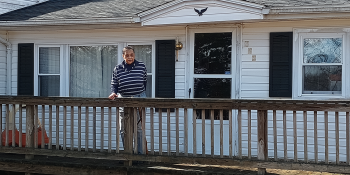
Helping a longtime resident age in place
